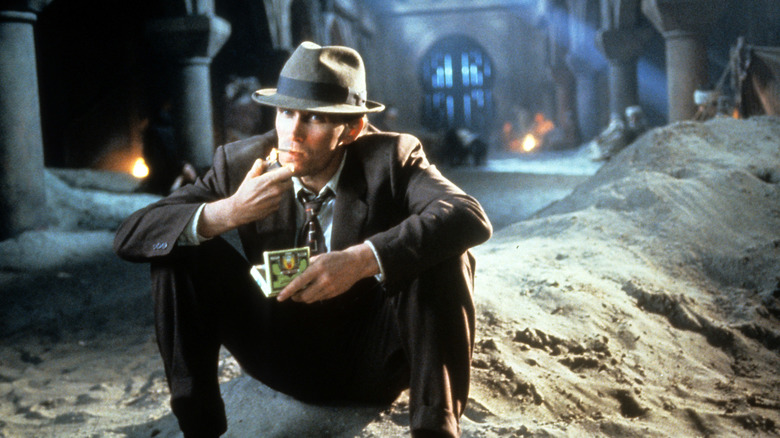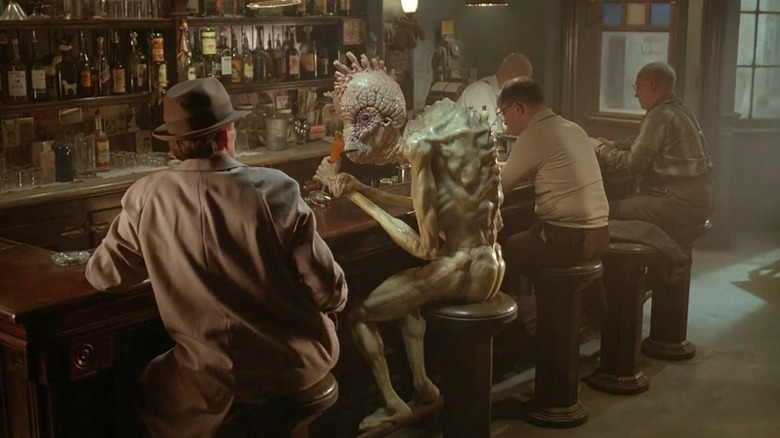Why Peter Weller Left The RoboCop Franchise For David Cronenberg
When body horror maestro David Cronenberg announced he would be adapting William Burroughs' "Naked Lunch" into a feature film, skeptics doubted whether or not the surrealist stylization of the groundbreaking novel would translate onscreen. Cronenberg grappled with many similar themes in his own work, but the question of how to transform the author's string of drug-infused imagery into a comprehensive narrative still remained. One person who championed the project from its inception was Peter Weller, who played protagonist Bill Lee. The role marked a major pivot in the actor's career from the blockbuster action series "RoboCop" into the world of psychedelic independent film.
Weller shocked his fans when he took the role, walking away from the third installment of the popular franchise. But the actor was a longtime fan of "Naked Lunch," having first read it as a teenager in the '60s. The novel caught his attention for its "irreverent" and "disobedient" themes and language, he explained in a TV interview. He enjoyed Burroughs' stream-of-consciousness style that he said "broke the form of the American novel." He went on to describe it as "a grab bag of visual imagery that has not been equaled since."
When the director of photography on "RoboCop 2" mentioned Cronenberg's plans to adapt "Naked Lunch," Weller "jumped out of the Robo-chair," he recalled to the Washington Post. He was so excited he sent a letter to Cronenberg himself, requesting the lead role. The director "hadn't even written the script of 'Naked Lunch' when Peter Weller's letter arrived at my door," Cronenberg told Australia's Special Broadcasting Service. Cronenberg often finds his scripts to be "intimidating for the lead actors," so Weller's enthusiasm gave him a huge push.
He loved the adaptation as much as the novel
David Cronenberg's version of "Naked Lunch" (1991) isn't a page-for-page adaptation, but it builds a bridge to similarly surrealist imagery. In the source material, time, space, and characters are constantly in flux. While the reality of the film is still limitless and magical, it holds a steadier focus on its protagonist, Bill Lee. It also presents a more coherent explanation for his hallucinations: an inhalant insecticide made from centipedes. Further, his occupations as an exterminator and a beat poet open the door for a world of imaginative insect imagery, like the cockroach typewriter that acts as Bill's own twisted Yoda.
For Weller, the film does his favorite novel justice even with its extensive creative liberties. He explained in a TV interview:
"I think it captures the flavor, it captures the spirit — I think it captures the sadness of it, the loss of it. It captures the excitement, the mystery of the thing, and not only that, it captures the comedy. It's a really funny book, and it's a really funny movie."
The actor was so enthralled by the opportunity to work on the project he walked away from "RoboCop 3" and a multimillion-dollar offer. He has no regrets, though. As he told the Washington Post, "sometimes God rings your bell and you'd better be there to hear it." He described himself as an "acid-head, earring-holed, hippie, wannabe-freak who also dated sorority girls ... trying to do the best of both worlds" in the '60s (via John at the Movies). In a sense, Peter Weller did "the best of both worlds" in the film industry as well, dating the proverbial sorority girl in "RoboCop" and dropping acid with the freaks in "Naked Lunch."

